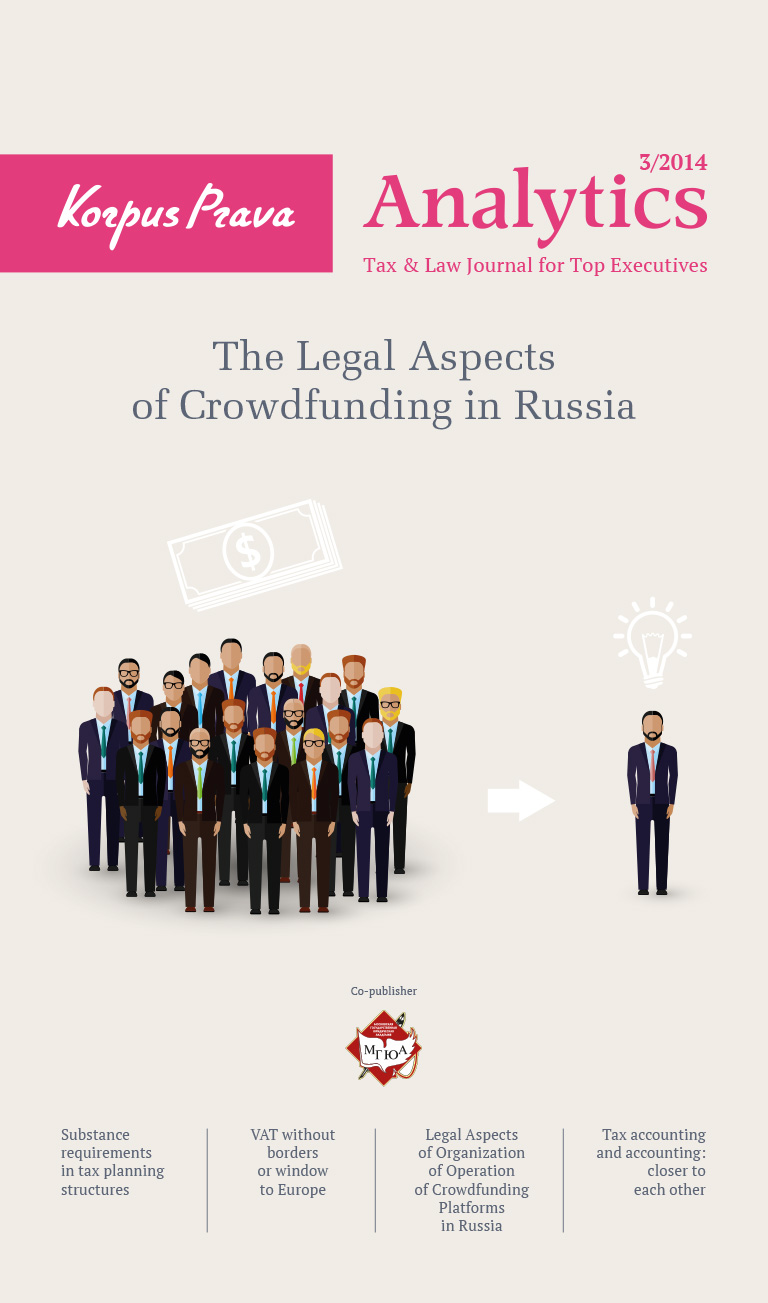- Cyprus Citizenship Scheme for Foreign Investors
- Squeezed But Pleased: Taxation of Passive Income in the European Union
- VAT Without Borders or Window to Europe
- Legal Aspects of Organization of Operation of Crowdfunding Platforms in Russia
- Substance Requirements in Tax Planning Structures
- “Deposit Splitting” of Individuals. Legal Civil and Criminal Aspects
Search for the Actual Income Recipient Continues
The supervisory authorities are paying more attention to the practical application of the concept of the actual income recipient. Everyone has heard the recent cases against such companies as “Northern Kuzbass” (A27-7455/2010), “Naryanmarneftegas” (A40-1164/2011), “OriflameCosmetics” (A40-138879/2014), etc.
In 2016, one of the most notorious cases was the case of “Severstal”, JSC (A13-5850/2014), on which the basic decision was made by the Arbitration Court of the Moscow District on March 15, 2016 (the final point was put by the Supreme Court of the Russian Federation on 05.08.2016, denying to transfer the case for consideration to the Judicial Board on Economic Disputes).
In this article, we propose to consider the essence of the case and have a look at the main arguments of the courts and the supervisory authority.
Briefly about the concept of actual income recipient: in accordance with the tax legislation of the Russian Federation, if an international agreement, containing provisions relating to taxation and fees, establishes other rules and regulations than those stipulated by the Tax Code, the rules and regulations of international agreements shall apply1.
However, if the international agreement of the Russian Federation on taxation provides for reduced tax rates or exemption from taxation in respect of income from sources in the Russian Federation for foreign persons having beneficial right to the income, in order to implement this international agreement, the foreign person shall not be recognized as the beneficial owner of such income. If the foreign person has limited powers in relation to disposal of this income, exercises in respect of the said income intermediary functions in the interests of another person, without performing any other functions and without incurring any risks, either directly or indirectly paying such income (fully or partially) to the other person who at the direct receipt of such income from sources in the Russian Federation would not be entitled to the use of the provisions of the international agreement of the Russian Federation on taxation specified in this paragraph2.
Thus, the company applying preferential taxation provided by an international agreement shall be ready to confirm and prove that it is the actual income recipient.
That is, first of all, it has a real presence (Real Substance) and, secondly, it carries out real economic activity (transactions made by it have a real economic/business purpose).
The core of a subject: singularity of this case is in the fact that the tax authority has unraveled non-classical conduit scheme for the payment of passive income abroad (dividends, interest, royalties).
This time, multi-corporate procedures aimed at restructuring the ownership of a large Russian mining holding company (“Severstal”) were under the close attention of supervising bodies.
In particular, the Russian company, being one of the shareholders of “Severstal”, used shares of “Severstal” as a contribution to the share capital of its subsidiary companies in Cyprus. That is, in turn, did the same by transferring the shares of “Severstal” to their Cypriot “daughters”, in which the second shareholder (having the right to corporate management) is a foreign company with a registration office in the BVI, affiliated with the Russian company.
The basis of the decision of the tax authority (and subsequently the Court) is the argument that the Russian company by performing a series of consecutive actions on introduction of the shares of “Severstal” to the authorized capital of subsidiary Cypriot companies actually made a free transfer of these shares to the address of companies registered in the BVI.
Thus, the transactions on property contribution (shares of “Severstal”) were deemed null and void by the court (due to their sham nature) and rules for the transfer of property without any compensation of the Russian company to the address of a foreign company that does not have a permanent establishment in Russia were applied to legal relations between the parties.
The main arguments of the tax authority in the case were:
- Interconnection of all participants of the performed transactions;
- Multistage transactions;
- Transit nature of transactions;
- No business economic goal of the Russian company for transfer shares.
The availability of the abovementioned circumstances taken together allowed the tax authorities to conclude that the actual recipient of income from sources in the Russian Federation (in the form of shares in the Russian company) was not a Cypriot company, but companies registered in the BVI.
Because of this, the Russian company paying income (transferring shares) had to calculate and withhold tax at source at the rate of 20% (guided by art. 309-310 of the Tax Code of the RF).
Schematic chain of transactions made by the company is given in the diagram below:

Notable is the fact that the courts of all instances (from the Moscow Arbitration Court to the Supreme Court of the Russian Federation) supported the position of the tax authority without leaving the taxpayer even the slightest chance of success.
This case along with other similar cases (which every year becomes more and more) is a kind of reflector and reflects current trends and attitude of regulatory authorities in relation to the schemes of tax optimization, aimed at the use of legal business structures for the purpose of the application of privileges and preferences of international tax planning, as well as in relation to the withdrawal of the Russian capital abroad. Now, this state’s position in the current political and economic environment is a regularity rather than an unexpected manifestation.
Findings
Despite the fact that the institution of “the actual income recipient” in the Tax Code of the Russian Federation was introduced only in 2015, international agreements on the avoidance of double taxation previously provided for the possibility of using the advantages of agreements on the avoidance of double taxation (including preferential rates) only in respect of persons:
- Having beneficial right to such income (interest, dividends, royalties);
- The main objective or one of the main objectives of the establishment or existence of which was not receiving benefits under the agreement.
The concept of an actual income recipient has been around for quite some time and has been used successfully in other countries (for example, in Switzerland, Austria, Germany, the Netherlands, etc.).
In this regard, you cannot blame the regulatory authorities, courts and our lawmakers that they “invented” something new, trying to complicate the life of the taxpayers by refusing in some cases to apply exemptions or preferences with only one purpose – to replenish the budget with new taxes. They just paid attention to the method of applying tax treaties preferences behind time, giving the way to tread the thorny path to their foreign colleagues.
So, all Russian companies engaged in financial transactions with foreign counterparties, using tax treaties benefits should be prepared for close attention from the inspection bodies. Key points on which the auditors focus in such cases and the arguments on which they base their arguments are reflected in court documents in similar cases. Therefore, in order to minimize these risks at least some way, we advise to review them and not to repeat similar mistakes.
In addition, in order to minimize the risks discussed it seems appropriate to comply with the requirements necessary for recognition of the beneficial owner of income of a foreign company, serving as the counterparty of the Russian company. These recommendations, of course, cannot be considered exhaustive and completely eliminating this risk. However, their implementation is a mandatory rule, non-compliance with which definitely jeopardizes the specified transactions.
- Paragraph 1 Article 7 of the Tax Code of the Russian Federation.
- Paragraph 3 Article 7 of the Tax Code of the Russian Federation.
Your subscription to our journal will definitely boost the efficiency of your specialists and downsize your expenses for consultants.
The journal is available free of charge in the electronic version.
Free Download

